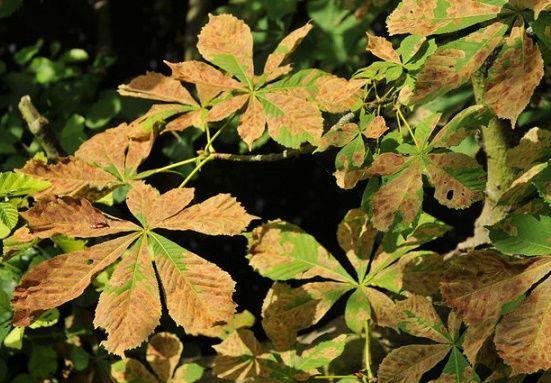The hot, calm and almost rainless weather this year has provided ideal conditions for the increase of horse chestnut leaf miner moths.
The small moths wreak havoc with horse chestnut trees and their effects can be seen all over the country: most of the leaves on the chestnut trees have already turned brown and dessicated, reports TV2 Nyheder.
The pests are almost impossible to eradicate, according to associate professor Hans Peter Ravn, an entomologist at the University of Copenhagen’s department of geosciences and natural resource management.
Too many to cope with
The problem is that the predators that usually keep moth numbers down just can’t keep up. They can only account for 10-20 percent of the numbers.
“This year has been a very successful one for the moths. If there had been rain and windy weather they would have had difficulty laying their eggs on the trees, but this year the calm and warm weather has led to extreme numbers,” said Ravn.
The result is that the grand avenues of chestnut trees that can be found in cityscapes all over Denmark will probably disappear.
“For example, I don’t think that Copenhagen Municipality has any plans to plant horse chestnut trees in the future,” added Ravn.
The only solution is to plant other types of tree, but if you still want to have chestnut trees, there is a solution: the red horse chestnut. These contain a substance that makes it impossible for the moth’s larvae to live in the leaves.
The moths also have another enemy, as a number of tits have found out how to open the moth’s pupae and eat the larvae before they turn into moths. As the birds can learn from each other, the trees might yet survive.
Some pests don’t like it hot
The hot summer has also had an inhibiting effect on a number of other pests. The number of mosquitoes, ticks and Spanish ‘killer’ slugs have been lower than normal, but as the warm weather tails off, they are set to make a recovery, biologist Anders Kofoed told ‘Go’ morgen Danmark.
“When you are a small slimy creature, you need your moisture. You simply dry up in the sun,” he said.
“Mosquitoes lay eggs in water and if puddles and rain-filled gutters dry out, it is bad news for them,” Kofoed continued. “Ticks are not fond of the sun because they are small and easily become completely dehydrated, and slugs – although they won’t necessarily die, it does inhibit their egg laying.”











